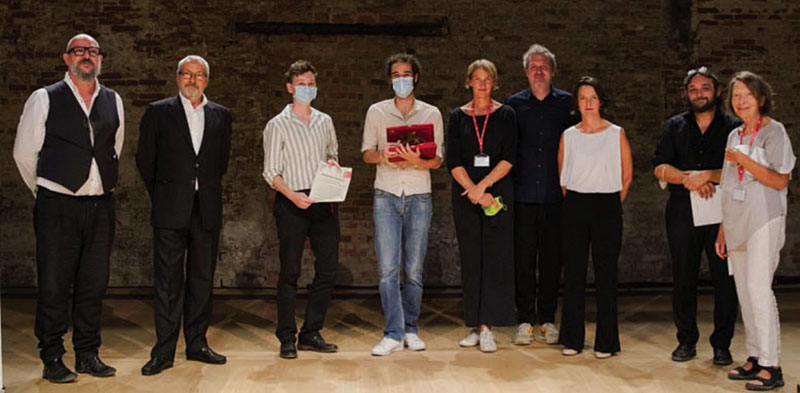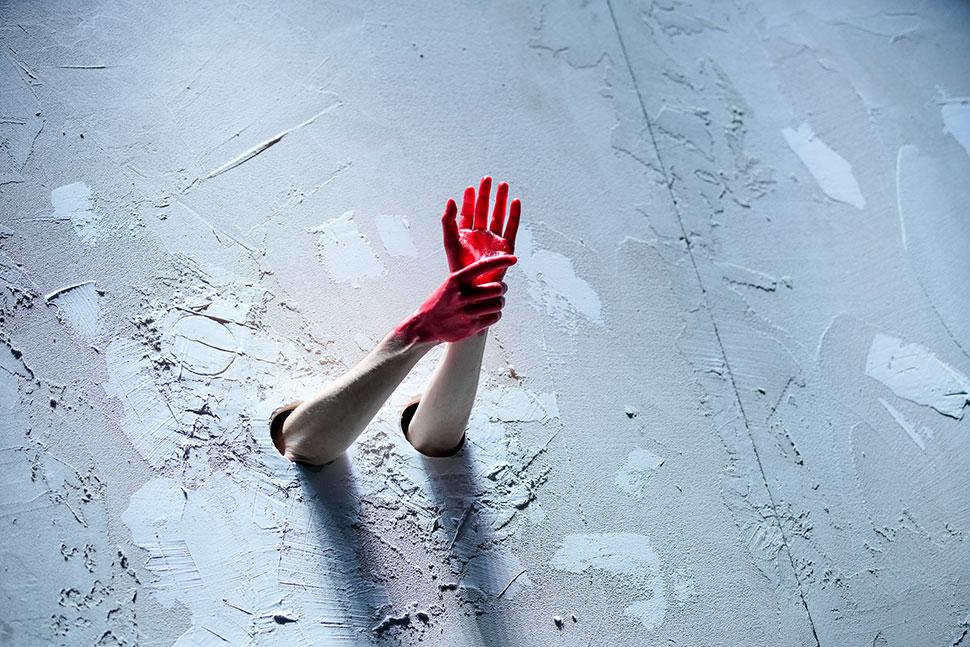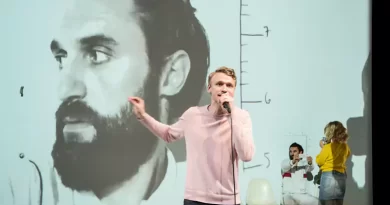Venice Biennale 2020
Margaret Rose in Venice at the Biennale di Venezia
27 September 2022
After a full lockdown in Milan from February to May of this year [2020] and with no theatres open, I expected the summer to be equally “playless”. I was imagining an extended vacation in the sun and open air after months shut inside in a big city. Then unexpectedly an invitation turned up from the 48th Venice Biennale to be part of an international jury. The then director Antonio Latella had decided, for the first time in the history of the Biennale, to create an international group of critics to judge the plays.
The 2020 theatre Biennale (from 14 to 25 September 2020) was also special from another perspective: no non-Italian or overseas companies were invited. For his final year at the helm of the Biennale, Antonio Latella, together with dramaturg Federico Bellini, programmed 23 shows that were directed and produced exclusively by Italian companies. It turned out that this decision, which had been made prior to the Covid-19 pandemic, made it possible for all the companies from the length and breadth of Italy to reach Venice. So, while many summer festivals were canceled or forced to go online, the Biennale presented what was a robust selection of plays, albeit with small audience numbers, social distancing, and face masks.

Antonio Latella, Roberto Cicutto, Liv Ferracchiati, Leonardo Manzan, Susanne Burkhardt,
Justo Barranco, Evelyne Coussens, Federico Bellini, Maggie Rose.
As in the first three years of his directorship, Latella proposed a specific theme, this time censorship. In an initial meeting with jury members, Latella’s passion for his work and his audacious vision for the Biennale festival and the Biennale college were apparent. He had, he said, chosen the companies, with a precise criterion in mind: “l’ve tried to build a map of artists who are rarely programmed by established theatres but who are attracting the attention of theatre critics and theatre makers; artists who, above all, are creating their own audiences, wide-ranging audiences that are not bound by the constraints of theatre season tickets. Many of the invited practitioners are young, some very young – fresh out of the Biennale Director’s College, and others are older but only in terms of age.”
Once Latella had selected the companies, he ran preparatory meetings with each one prior to their deciding on the play they would bring to Venice. While the theme was the same for everybody, Latella underlined how he had insisted that each company should feel free to develop their ideas, unhampered by worries about funders and producers. He also proposed an interpretation of censorship in its different meanings: censorship by governments and self-censorship. In this first category, Liv Ferracchiati chose Anton Chekhov’s Platonov, a play that the Russian writer penned in 1878 but which was not accepted for performance and publication until 1923; Fabio Condemi translated, adapted and directed the Marquis de Sade’s long reviled Philosophy of the Bedroom; the Biancofango company presented a stage adaptation of Vladimir Nabokov’s 1955 novel Lolita which likewise came in for harsh treatment in the 1950s and 1960s.

Philosophy of the Bedroom. Fabio Condemi’s adaptation of a text by the Marquis de Sade.
Photo credit: Andrea Avezzù.
Other groups probed imaginatively and in startling ways into the theme of self-censorship. Latella went to some lengths to explain to us the specific situation in Italy, where the lack of an Arts Council means that funding for contemporary theatre is thin on the ground and, compared to Western European nations, inefficiently distributed. This results in a dearth of contemporary plays and also in the widespread practice of self-censorship on the part of many practitioners. The demands and expectations of theatre producers sometimes impact on new writing and new productions, while funding bodies like banks and foundations set out precise guidelines which companies must follow if their application is to have any hope of success, a state of affairs once again bringing with it a curtailment of artistic freedom. Latella also aimed to bring these Italian practitioners to the attention of critics and theatre people outside Italy – hence, in part, the reason behind an international jury.
The jury was made up of Justo Barranco (theatre critic for the daily newspaper La Vanguardia), Susanne Burkhardt (Deutschlandfunk Kultur), Evelyne Coussens (theatre critic for the daily newspaper De Morgen), and me (Plays International & Europe). From day one, our small group gelled. Following Antonio LatelIa’s briefing, we began a ten-day marathon doing the rounds of the various venues of the Biennale, taking in the magnificent Teatro Goldoni and the theatres in the former shipbuilding yards and warehouses of the Arsenale. I felt exhilarated by this special experience, as did also, I believe, my fellow jury members. In the midst of a pandemic, we were truly privileged to be able to see so much live theatre and feel ourselves part of a very particular Italian theatre community that sprang to life in Venice over the festival period.
The shows of these young companies had at their heart questions of censorship and/or self-censorship, but they likewise unpicked those issues that are shaping our lives in this third millennium — the eternal ones as well as the conversations developing right now that hint at a new world order.
The topics ranged from women’s role in society, the current gender revolution and the inequality that permeates and decides our destiny to the envisioning of radical change and ways that this might be achieved. Surprisingly, or perhaps not so seeing how fragmented Italy really is, a startling assortment of voices, styles, and stories characterized the contemporary plays and the adaptations of classical work that were showcased. This triggered a lively debate among jury members, making our selection of the two award-winning plays fraught with difficulty.
In the end, we gave a special mention to Liv Ferracchiati’s La tragedia é finita Platonov, a radical reworking of Chekhov’s Platonov, produced by the Baby Walk company, which saw Ferracchiati in the roles of writer, adapter, director, and performer. His adaptation was deftly executed; he reduced the original five-hour play to ninety minutes, cutting the male characters except for the protagonist, Mikhail Platonov, and thereby foregrounding the four female characters in the original script. This reduction allowed the women’s very different relationships with the protagonist – the tormented, albeit brilliant, Mikhail Platonov – to emerge. Liv Ferracchiati also invented a modern-day character called the Reader (which he played), who was positioned downstage left, rowing a small boat. This figure allowed the author-adapter to analyze Chekov’s characters — their motives and sexual politics — from a contemporary perspective. With breath-taking authenticity, the Reader offered us a satirical, sometimes emotional and amusing commentary that focused on Platonov, whose doubts, uncertainties, and refusal to indulge in self-censorship he clearly identified with. The illuminating, ironic dialogue between Ferracchiati and the Russian author succeeded in breathing new life into a classical play.

Glory Wall by Leonardo Manzan, Paola Giannini, and Rocco Placidi.
Photo credit: Andrea Avezzù.
The Best Play Award went to Glory Wall, an original work by Leonardo Manzan, Paola Giannini, and Rocco Placidi. Directed by Manzan, the play addressed the Biennale’s theme of censorship head-on, incorporating some brilliant intuitions and an original form. The term itself, “Glory Wall”; speaks powerfully given the allusion to “glory hole” and its sexual connotations and the word “wall” which looms large in global politics. As audience members entered the theatre, we were confronted with a huge white wall positioned downstage (beautifully designed by Giuseppe Stellato) which prevented a full view of the stage. The wall seemed to stand as a metaphor for the impossibility to stage a play about censorship in a country where it does not exist, and as a symbol for the separation of ideas, countries, and peoples in today’s world. Glory Wall opened with a series of questions as to why, if the invited companies were completely free to do what they wanted (as Antonio Latella had briefed them), did they have to stage a play along the theme of censorship and be judged by a jury. This entertaining but provocative banter, which simultaneously appeared in writings on the wall, soon gave way to short dialogues, accompanied by micro-actions performed by hands, wrists, and arms. Manzan deftly arranged and orchestrated these to keep the audience in a state of astonished alert. The focus at this point turned to self-censorship, censoring others, and the dwindling importance of the theatre in the wider cultural landscape. While the stage picture kept morphing in surprising ways, these fleeting snapshots resonated in the mind’s eye.
The show seemed to me to bring Samuel Beckett‘s experiment in Not I, with its single mouth, to another level. The show took an immersive and more playful turn as a female voice asked an audience member for a lighter as a hand, holding a cigarette, shot out from a hole in the wall, or another spectator was asked to pick up a dictionary, which appeared in another hole, and read the definition of censorship aloud. Other audience members found themselves hearing instructions on how to perform some texts by leading historical figures who experienced censorship: Giordano Bruno, the Marquis de Sade, Pier Paolo Pasolini. lt appeared to be an invitation to the audience to consider censorship from different angles and in different timescales. Leonardo Manzan’s unflinching and sometimes provocative questioning of the role and meaning of theatre today and his outstanding directorial talent won him the First Play Award.









